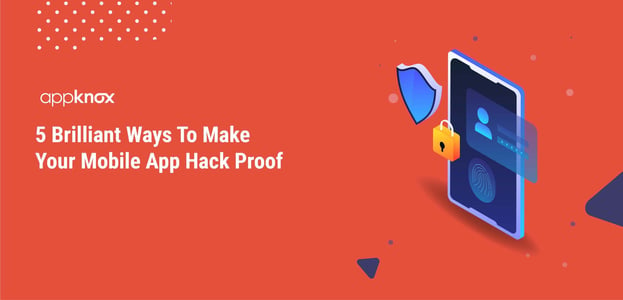
BLOG

BLOG
Holiday season is just around the corner and e-commerce retailers are gearing up to supercharge their inventories, optimizing their websites and even launching their own apps to offer a great shopping experience to their customers. However, you wouldn’t win a sale if they don’t feel safe buying on your e-commerce store. The increase in mobile apps has given a rise to the cyber crimes that could result in the loss of customer’s personal information, key intellectual property, millions of dollars and most significantly your customer’s trust. It’s important for e-commerce retailers to act proactively to protect their app against the cyber crimes. So here you go with the 5 brilliant tips to make your mobile app hack proof:
Whether it be Android, iOS or any other mobile platform, developers have access to hundreds of libraries to accomplish different tasks in an application. To have your mobile app hack proof, updating the libraries is a practice that everyone should follow. There are libraries for testing, user interfaces, notifications, weather, music, augmented reality, and so much more. Libraries help make life easier for developers because they don’t have to reinvent the wheel for many of the basic functions. While that’s a pro, the issue is that often outdated or old libraries are the targets of dedicated security attacks. Developers of these libraries often would release updates to fix these issues, hence it is important to manage updates as they come.
Hyper Text Transfer Protocol Secure (HTTPS) is the secure version of HTTP, the protocol over which data is sent between your browser and the website that you are connected to. HTTPS pages typically use one of two secure protocols to encrypt communications - SSL (Secure Sockets Layer) or TLS (Transport Layer Security).
To implement an HTTPS connection, you will need an SSL certificate. Why is it needed? Well, in simple words, all the communication sent over a regular HTTP connect are in plain text and hence can be read by any hacker. The situation becomes grave if you are trying to get a payment from a customer. Details filled in the form, like credit card, social security number, etc. can be read by hackers. With an HTTPS connection, all communications are securely encrypted and making your mobile app hack proof. This means that even if somebody managed to break into the connection, they would not be able to decrypt any of the data which passes in between.
A regular code review by a developer may not be enough to ensure the security of the app as they usually limit their work to the technical functionalities. For a full-proof security, a security expert should review the code to analyze possible vulnerabilities in specific areas of a code such as authentication & authorization parts, database access, input and output & use of cryptography etc. that may be prone to cyber attacks. By reviewing the codes by security experts, you tend to make your mobile app hack proof.
Though a security expert might help you secure your app, as a matter of fact an in-house security expert is considered a luxury which many companies don’t have. In such a case, 3rd party mobile security testing tools come in handy that can quickly scan the vulnerabilities in your app & help you fix them.
Good Read- Mobile App Hacking and its growing popularity
At Appknox, we use a 360 approach to securing mobile apps. We scan your code in different test cases specific to your business. It ensures protection not only from the common cyber threats but also from the strategic hackers.
In the rush of this holiday season, we are doing a Free Mobile App Security Scan to help e-commerce retailers get an idea of where they stand in terms of security. You'll also get a report which will contain all high-risk threats that your mobile app is exposed to.
One of the biggest mistakes is to trust all the inputs from a user, a major cause of injection attacks. Injection attacks such as SQL Injection on client devices can be severe if your application deals with more than one user account on a single application or a shared device, or paid-for-only content.
Mobile applications access different kinds of data depending on what they are being used for. Often, when mobile application access business data or documents, these are stored on the device. In case the device is stolen or if proper encryption is not used, this data can be accessed by the non-enterprise apps sitting on the phone.
Application sandboxing against malware and other forms of criminal access can help keep your data safe and thus make your mobile app hack proof and secure 360 degrees. Also, individual elements should be encrypted so as to control application data sharing on the device.
.jpg?width=50&height=50&name=10606600_10204086667262761_7381430219125488912_n%20(1).jpg)
Hackers never rest. Neither should your security!
Stay ahead of emerging threats, vulnerabilities, and best practices in mobile app security—delivered straight to your inbox.
![]() Exclusive insights. Zero fluff. Absolute security.
Exclusive insights. Zero fluff. Absolute security.
![]() Join the Appknox Security Insider Newsletter!
Join the Appknox Security Insider Newsletter!
